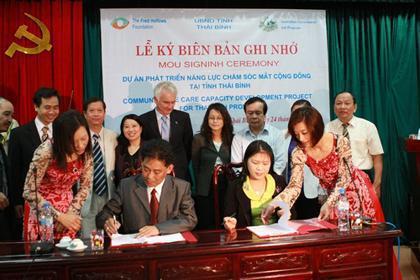Vietnam - Australia comprehensive partnership in review

The Paris Agreement ending the war and restoring peace in Vietnam was inked and ushered in a new period in the bilateral friendship and multi-faceted co-operation between the nations.
In reviewing the 40 year relationship, a steady and comprehensive development can be discerned, which especially flourished following the 20th anniversary of bilateral diplomatic ties in 1993 following an official visit by Prime Minister Vo Van Kiet to Australia in May 1993; which was the first high-level visit in the history of the bilateral relationship.
Over the past 20 years the two sides have exchanged over 29 high-level delegations and have maintained regular meetings on the sidelines at international conferences that have contributed to an enhanced mutual understanding and nurtured the trust between both nations’ leaders and people.
In September 2009 the bilateral relationship was elevated to a comprehensive partnership that culminated in signed agreements to boost the political relationship, economic growth and trade exchanges, develop the security and national defence relations, and strengthen the co-operation in education, climate change, hydrology, environment and people exchanges, together with technical and development aids. The Vietnam-Australia Action Plan for the 2010-2013 period was subsequently implemented to realise the goals of this newly formed partnership.
Both countries have established and promoted the bilateral co-operation and coordination at regional and international forums, including the Joint Trade and Economic Co-operation Committee, Strategic Dialogue 2+2, and Senior Consultancy on Development Aid.
Economic and trade co-operation has flourished. Australia was one of the first countries to remove the trade ban against Vietnam in 1991. Many Australian businesses pioneered economic co-operation with Vietnam, including Telstra, which provided technical support for the country’s first tele-communications network, BHP, one of the first oil and gas companies to commence exploration of the continental shelf of Vietnam, and ANZ, who opened a representative office in the country when the Law on Foreign Investment in Vietnam came into effect.
Bilateral trade has reached over a 20% year-on-year growth rate and more than US$5 billion in 2012, a fifteenfold increase from 20 years ago. Vietnam has become Australia’s 15th largest trading partner and Australia has been the 13th largest of Vietnam. With a total investment of over US$1.3 billion, Australia has become the 21st largest investor in Vietnam.
The oceanic country has given priority to providing development aid to Vietnam, with over AUSD1.6 billion for infrastructure, education, hunger eradication and poverty reduction. Such outstanding projects as My Thuan and Cao Lanh bridges have and will continue to make important contributions to the socio-economic development of the Mekong Delta region and are a vivid symbol of the bilateral friendship.
The co-operation in education and training is another priority of Australia and it has granted over 400 scholarships to Vietnamese students annually, making the cumulative total number of the scholarship recipients, who are all key persons in the country’s economic and administrative agencies, nearly 4,000.
Bilateral ties in national defence, security, culture, science and technology have also been promoted.
Cultural and people exchanges between the two nations have continuously developed. Hundreds of thousand of overseas Vietnamese have settled down in Australia, together with over 300,000 Australian visitors to Vietnam annually, have contributed to promote the exchanges.
Cultural and art exchange weeks, particularly the Vietnam – Australia Working Holiday Programme to be signed this year, will further expand exchanges and promote tourism, and contribute to an even deeper understanding between both countries’ people.
Vietnam highly appreciates Australia’s development over the past years, making Australia a major economic force in the world with a modern industry and agriculture, advanced education and science, playing an important role in both the region and world.
Vietnam wishes to share and learn from the experiences of Australia, especially in mineral exploitation and processing, scientific application in agriculture, post-harvest storage, food hygiene and safety, and high-quality human resource development.
In accordance with the spirit of the 40th anniversary of friendship and comprehensive co-operation, sound bilateral relations will not only continue to be strengthened between the nations but will continue to flourish on the solid foundation laid along with both sides’ steadfast determination.
What the stars mean:
★ Poor ★ ★ Promising ★★★ Good ★★★★ Very good ★★★★★ Exceptional
Related Contents
Latest News
More News
- Russian President congratulates Vietnamese Party leader during phone talks (January 25, 2026 | 09:58)
- Worldwide congratulations underscore confidence in Vietnam’s 14th Party Congress (January 23, 2026 | 09:02)
- Political parties, organisations, int’l friends send congratulations to 14th National Party Congress (January 22, 2026 | 09:33)
- 14th National Party Congress: Japanese media highlight Vietnam’s growth targets (January 21, 2026 | 09:46)
- 14th National Party Congress: Driving force for Vietnam to continue renewal, innovation, breakthroughs (January 21, 2026 | 09:42)
- Vietnam remains spiritual support for progressive forces: Colombian party leader (January 21, 2026 | 08:00)
- Int'l media provides large coverage of 14th National Party Congress's first working day (January 20, 2026 | 09:09)
- Vietnamese firms win top honours at ASEAN Digital Awards (January 16, 2026 | 16:45)
- ASEAN Digital Ministers' Meeting opens in Hanoi (January 15, 2026 | 15:33)
- ASEAN economies move up the global chip value chain (December 09, 2025 | 13:32)

 Tag:
Tag:

















 Mobile Version
Mobile Version